Guest Post by Sarah.
The day I heard ISIS had claimed Palmyra, I pulled out a dusty 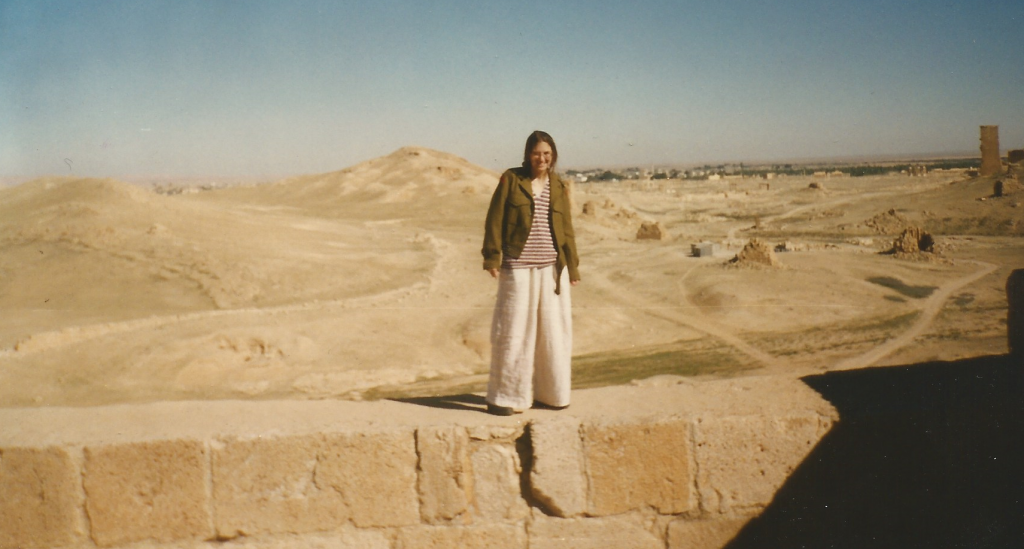 album and turned the pages until I found the pictures I was looking for. I ran my finger over them, wanting to feel the smooth ancient columns, taste the air, hear the music. A few days later I read the news –
album and turned the pages until I found the pictures I was looking for. I ran my finger over them, wanting to feel the smooth ancient columns, taste the air, hear the music. A few days later I read the news –
Four-hundred dead in Palmyra, their mutilated bodies lining the dusty roads, their blood staining the sand red.
I found I could not breathe.
Four-hundred dead in Palmyra. In the scheme of such things, it is nothing – a trifling amount. Pol Pot killed nearly 2 million in Cambodia. Hitler had his 12 million in the Holocaust. Mao killed almost 80 million in China. Four-hundred dead in Palmyra. It hardly warrants a mention.
But once I walked those dusty roads. Once I touched those ancient columns. Once I danced in that amphitheatre.
I close my eyes and I am there again. It is the end of Ramadan, and all over the world, Muslims are celebrating Eid. Four of us leave Cairo and fly to Syria. We have not told our parents; we know they would worry and try to stop us. It is the first very grown up thing we have ever done, to go on a trip like this, without their knowledge. We are quietly thrilled at the indiscretion.
In Palmyra we explore the ancient ruins. I am the only one there who is familiar with the Bible, and so, as we walk through the Temple of Baal, I cast my mind back to Seminary and tell them what I remember: pagan idols, false gods, human sacrifices. They tremble in horror. I thank Brother Davis quietly, wondering what he would make of this place, which still, somehow, feels evil.
(Eighteen years later, and once more the blood runs freely. How history repeats!)
We walk amongst the columns, touching them, climbing up on them, wondering that we can move so freely there. There are no ropes; no guides telling us we cannot touch; nothing to stop us from destroying them, if we should wish to do it; although we do not – we are awed, inspired.
We make our way to the amphitheatre, laughing at the disconnect, the new stone of a 1960s restoration clashing with the old. We hear them before we see them, and enter to find a group of young Syrians, folk-dancing on the stage.
I am excited. I know the steps, if not the dance; my last semester at the University of Oregon I took a Folk Dancing of the Middle East class. My friends settle on to a bench near the top of the amphitheatre; I edge closer, ever closer to the stage. I want to dance, but I lack the words to ask, and I lack the confidence to assume. And so instead I sit in the front row, and hope.
A young woman breaks away from the circle. She approaches me and stretches out her hand. “Come,” she says, and in gratitude I take her hand, and follow her on to the stage. I smile shyly at the others. They make the circle larger so that there is room for me. We clasp hands. Together we move in unity, crossing the stage as one. And they are so normal, in their jeans and sweaters and jackets and sandals, boys and girls holding hands, sharing a joyful moment during a holiday break. At the end of the song we clap, and shake hands, and hug. And then I motion to my friends in the stand and make them understand that I must go, but I am so, so thankful for what they have just given me.
We know we will never see each other again. There are no pretences, we do not exchange e-mail addresses, we do not even exchange names. But that does not mean we are not friends. That does not mean we do not matter to each other. That does not mean I will not carry them in my heart.
Eighteen years, and through those years I have dusted off that memory and shared it whenever someone said something disparaging about Syria, a country I grew to love, eighteen years ago, in only a handful of days.
Four-hundred dead in Palmyra. A trifling amount.
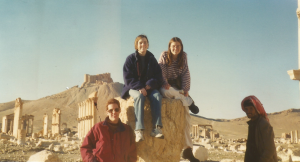 I scan the old photo into my computer, and zoom in, closer and closer until the tiny faces lose their features. I want to know who they are. I want to know where they are.
I scan the old photo into my computer, and zoom in, closer and closer until the tiny faces lose their features. I want to know who they are. I want to know where they are.
That girl who reached out to me – who sensed what I was too afraid to say – who drew me in and made room for me: Is she a mother, huddled with her children in a refugee camp? Is it her blood now that spills over the dusty ruins? Is she a fighter for ISIS? When she thinks of that day, does she shudder in disgust that once she reached out to an American?
Does she hate me?
I tremble and fall, a mess of shaking limbs on the floor. I cry out to God in despair and heartache:
How, God? How can You love us still? We who were meant to be Your crowning glory – we who were created just a little lower than the angels – we who have destroyed Your beautiful creation, we who have destroyed each other, and said we were doing it in Your name. How can You love us still?
And in return, there is silence. Has God forsaken me, in this my hour of greatest need? Or is He, like me, collapsed in a huddled mass, in a distant corner of heaven, heaving in grief?
My father reminds me that we must have our agency and I want to yell at him for it. Agency? What do I care about agency? What do I care about the agency of the men who would butcher children and leave them broken in the streets for the birds to peck at? I care only for those half dozen figures, turned away from the camera, holding hands and dancing in a sun-drenched square.
Once God sent a flood to destroy the world and I wish He had never made that promise, to never do it again.
Once God sent a Saviour to redeem the world and I wonder if we were worth it to Him, or if He regrets it.
And Jesus died for them, too.
I look up at the winter sun (it was a day so much like this one, when I danced in a square in Palmyra) and ponder that He would descend to die for these men, these butchers, and their sins. What is God’s mercy, that it can extend even to the likes of these?
Are they also my brethren?
Once God held these fighters in His arms and sent them down to earth, and then they turned murderous and evil and committed great atrocities. But if God is really our father – not only mine, but also theirs – can He ever stop loving them? Even as they shed blood and pretend it is His work, does He love them still?
And if He is in a distant corner of heaven, heaving with grief, perhaps it is not just for the victims, but also for these lost souls, His children, whom He also loves.
This I know: They are not worthy of His love.
This I know: I am not, either.
Once I danced in an amphitheatre in an ancient city, surrounded by people I loved. Once I took their hands and we sailed together over broken cobblestones. Once they smiled at me, and I smiled at them, and we embraced, and I left, and promised to keep them in my heart forever.
They are still there. If they are refugees, fleeing from the violence; or if they are dead, their broken, battered bodies left to the ravages of nature; or if they are fighting, if they have taken up arms and committed these horrible acts – they are still there.
Once I walked those dusty streets. 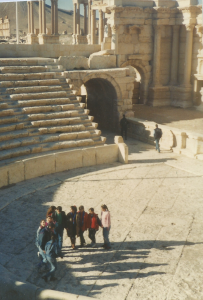
Once I perched on top of a necropolis.
Once I posed for a photo on a broken Roman column.
If I close my eyes, it is like that still.
I could keep my eyes closed forever.


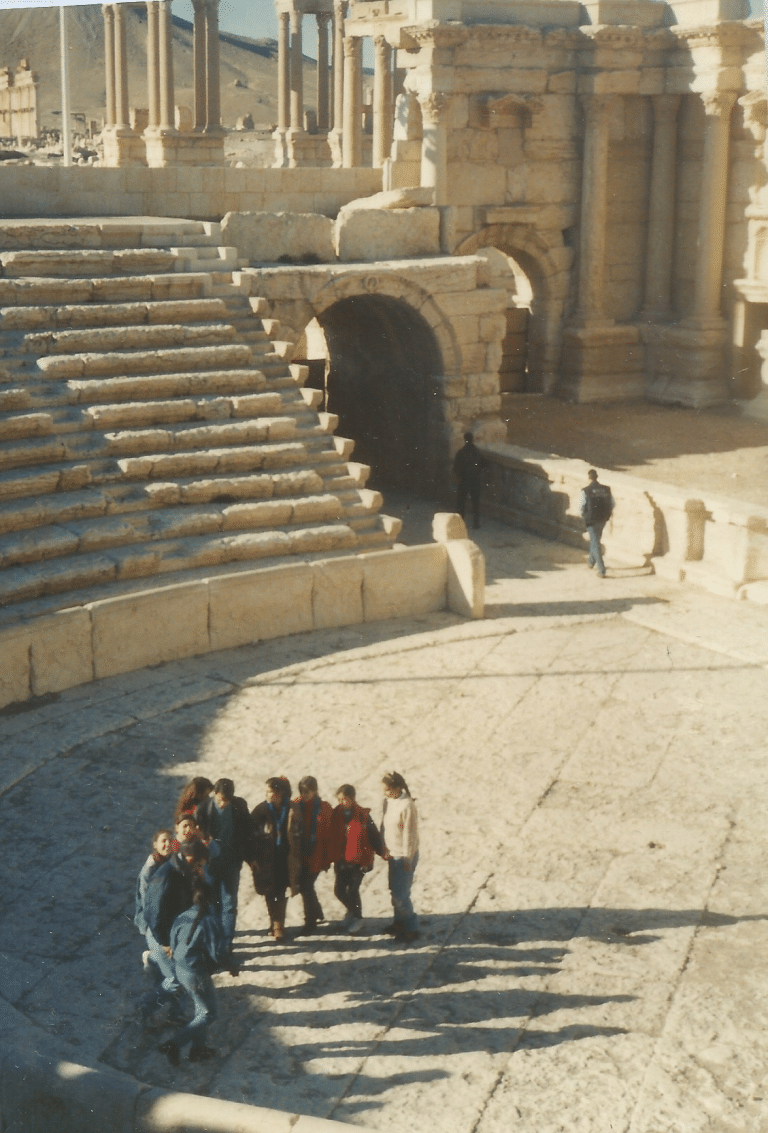
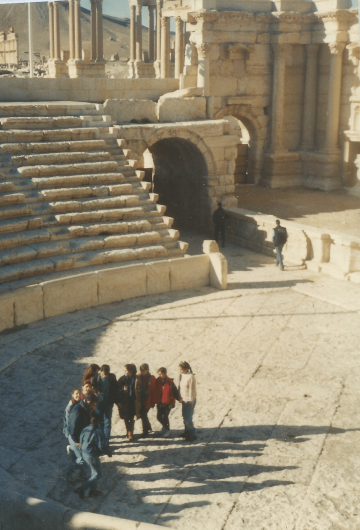
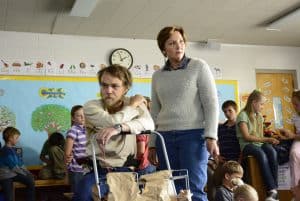
5 Responses
Thank you for this, Quimby.
So sad and so wonderful. What an amazing experience to have in your memory. And how sad to have the horrible present to relate it to. Thank you!
So wonderful. So heartbreaking, I am so sorry.
I recently watched the movie Noah, expecting to hate it, but I loved it, and the questions it raises about how God judges us, and when he lets us go on. I hope there will always be candles of light that cannot be snuffed out.
Thank you so much for sharing this, Quimby. I teared up reading it, feeling every step you took along this path. There is so much of the world that is hurting, and has been hurt, that I often feel overwhelmed by it all. Thought my experience is not the same, you worded my feelings perfectly.
[…] post by Quimby. You can read some of Quimby’s previous posts here, and […]